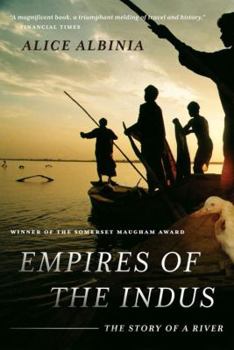Empires of the Indus: The Story of a River
Select Format
Select Condition 
Book Overview
One of the largest rivers in the world, the Indus rises in the Tibetan mountains and flows west across northern India and south through Pakistan. It has been worshipped as a god, used as a tool of imperial expansion, and today is the cement of Pakistan's fractious union. Alice Albinia follows the river upstream, through two thousand miles of geography and back to a time five thousand years ago when a string of sophisticated cities grew on its banks...
Format:Paperback
Language:English
ISBN:0393338606
ISBN13:9780393338607
Release Date:April 2010
Publisher:W. W. Norton & Company
Length:402 Pages
Weight:0.75 lbs.
Dimensions:1.0" x 5.6" x 8.2"
Customer Reviews
4 ratings
An amazing read
Published by Thriftbooks.com User , 13 years ago
This book is a brilliant piece of writing and coming from someone so young, a great portent for the future. The writer is no mere traveller breezing through places in a superficial way and make pronouncements with the thinnest veneer of knowledge to guide her. Her writing has scholarly depth, shows great curiosity and wonderful impartiality as she wends her way through the Indus and Sindh, encountering various sects and peoples, and giving each side an equal say. We see flashes of the writer's droll sense of humor mixed in with genuine observation as in the instance when a Pakistani official complements her on her beautiful Urdu and across the border in India a Customs official hearing the same language, praises her "amazing Hindi." In the first few chapters I thought that the writer's research, coupled with her contacts in Pakistan, were what made the writing thick with detail. A quarter of the way through the book it occurred to me that the reason why the work has depth is because Ms. Albinia speaks both Urdu and Hindi and what a world of a difference that makes. She is able to communicate with people from every level of society, from the feudal landlord to the peasants of Sindh, each of whom impart their own history. Her portrait of the Sheedis reveals a timeless people excluded from the knowledge of most Sindhis. Ms. Albinia never passes sniffy judgements on poverty or morality, but gracefully melds into a succession of households, high and low, treating each with respect and affection. Her stay in Afghanistan is negotiated with astounding grace and a sure footed understanding of genuine cross cultural communication. A quite remarkable thing indeed. Ms. Albinia's portrait of the Indus and it's history shows very clearly that for hundreds of years Hinduism, Buddhism and Islam accommodated each other's perspective and lived in harmony. Her exposition of the various saints' 'urs' and the piety of the devotees shows what an enduring grip Sufi Islam has not only in Sindh, but in every province of Pakistan. The followers of Sufi Islam believe in a kinder, gentler Islam that treats all of creation with respect and humility and completely disavow the smash and grab violence of the Wahhabi perspective. This book should be required reading for anyone seeking to understand the current conundrums of Pakistan and Afghanistan.
Culture
Published by Thriftbooks.com User , 13 years ago
Extremely well written and researched. Like the wit and the writing style of the Author.Has included the latest research on the history of these people. Author is a wonderful storyteller.
A great travelogue and history revisited...
Published by Thriftbooks.com User , 13 years ago
This is an amazing book about a very old and historic region. Ms. Albinia has taken on a unique subject, the Indus River, and has given us an adventurous account of both her travels and the rivers place in history. As a reader I was often concerned for her safety, as some of her accounts are rather scary. A fan of the writings of William Dalyrymple, Micheal Woods, Peter Hopkirk and Colin Thubron, I find Albinia's writing style exciting and informative. I recommend this book very strongly.
Interesting Historical Tidbits mixed with Travel Narrative
Published by Thriftbooks.com User , 14 years ago
This book is as much about Pakistani culture as it is about the Indus river. The author journeys upstream along the Indus River, devoting a chapter to each of the significant historical movements in the river's history. I enjoyed gleaning bits of history about the province of Sindh, the water-god Uderolal, the relationships between various classes of Pakistan, etc. especially since my ancestors are from Sindh. And yet, though the writing is good and the subject interesting, I found it tough going at times. I think this is because this book is torn between being history as well as a travel narrative. Some of the chapters are much more coherent and cohesive than others. For example, the final chapter is among the best writing in the book. She describes her travel in Tibet and her travel companions with such clarity that the experiences really come alive. The first couple of chapters -- about modern day Sindh and Pakistani society -- are also very good, and I enjoyed the information about Mohenjodaro. It made me want to read a book devoted to that subject entirely. This is the beauty of reading a book with such a vast range -- it gives you a taste of things so you can explore items of interest in greater detail elsewhere. The author also enlightened me on the importance of a river in an agricultural society and how dams impact the societies along a river. I recommend this book if you are interested in Pakistani or Indian culture. And if you are fascinated with rivers and their impact on societies, you will love this book. I think the writer will mature and I look forward to her future works.





